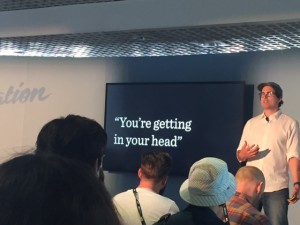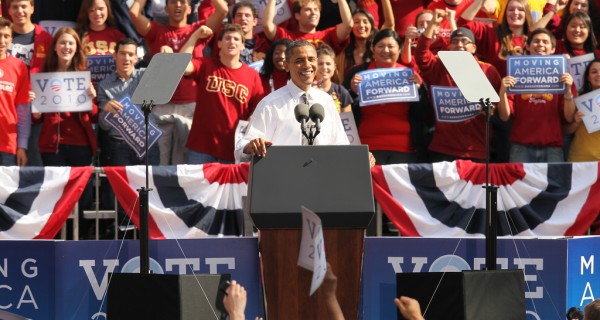BALANCING SCIENCE AND CREATIVITY – IT’S A CANNES THING
 By Susan Perolls, Cannes Correspondent for TheMarketingblog (from a series of events and interviews across Day Two of the Cannes Innovation Festival)
By Susan Perolls, Cannes Correspondent for TheMarketingblog (from a series of events and interviews across Day Two of the Cannes Innovation Festival)
At an event that’s focused on innovation it’s unsurprising how much time and floor space at Cannes has been devoted to technology, with Samsung’s VR booth, for one, attracting big queues. What has been really satisfying, though, has been recognition at the conference of the value of people when it comes to invention and creativity.
Yes, we know marketing is about people in terms of consumer-centricity, but the importance of the talent behind great campaigns was also top of mind of many speakers at Cannes.
Raja Rajamannar, CMO at Mastercard, sees attracting and retaining the right staff as his single biggest challenge today. The brand is moving towards ever more complex forms of marketing, such as real time marketing that recognises trends before they happen and creates marketing opportunities around them within 12 hours. The multifaceted nature of its campaigns requires a real mix of classic marketing skills around consumer behaviour and digital skills focused on technology. Rajamannar has found true marketing-tech hybrids to be in short supply.
Anna Mukherjee, Global CMO at SC Johnson also appreciates the need for a balance in skills amongst staff, but is concerned that art should be valued as much as science. As she said, ‘Marketing cannot be formulaic. Consumers want to be dazzled and to do this you need to bring on board great creative talent and to nurture it.’
So what are today’s CMOs and agency heads doing to cultivate great staff that push the boundaries and create cut-through campaigns? Rob Sherlock, CEO and Worldwide ECD at consumer activation agency ADK Global believes that it is important to give staff the freedom to fail – otherwise you will only encourage safe ideas; and that’s never going to be good enough to stand out in such a competitive marketplace.
He also encourages staff to say no if they think that’s the right response. As he explained, ‘when people say no it creates a struggle but it’s also an enabler. It makes you assess and rethink what you’re doing which is usually a good thing.’
A number of speakers cited Google as the model to emulate when it comes to attracting and retaining the new kids on the marketing block – millennials. For example, 70% of MasterCard’s new hires are aged 34 and under, hence the office has been ‘Googlefied’ to look cool and build a creative environment. Plus staff compensation isn’t seen just as paying good money, but also offering many softer benefits. These include flexible hours, time off to volunteer for charities and the chance to take an active role in personal development, like working on cross-functional projects or stints in the company’s other offices around the world; all elements that appeal to this group.
Robbie Douek, Managing Director, EMEA at content company Maker Studios Inc suggested that, ‘Having a serious and professional style may be important for many brands, but a corporate environment won’t work for any organisation wanting to attract young talent’.
That said, Sherlock suggested that not all companies can change overnight to be hip. Authenticity was perhaps one of the most overused words at Cannes, but it’s true that brands cannot reinvent themselves instantly and still be an honest reflection of who they are. He explained, ‘We don’t all need to have a play lounge. What’s important is to make changes in bite sized increments. Sometimes it can be small changes that make a difference to how staff feel about your business.’
Jonathan Coulter of media & marketing recruitment consultancy Talentarc which sponsored a session with the IAA on ‘Leading Creative Talent (video courtesy of www.vision-network.eu)’ has been observing changes in industry talent for years. He believes that what the industry is seeing now is an exciting period of transition with the marketing ‘old guard’ and millennial influx coming together, with both proving to be transformative forces.
In his view, ‘Millennials are playing an increasingly important role in the marketplace, but there is room for both groups. What is interesting is that there is a new spirit of openness at all levels that is creating something positive and fresh in the way people work. While senior marketers are mentoring the fresh talent to grow their foundations in marketing, these same people are also being mentored by graduates in new trends and technology.’
But how do people keep pushing the boundaries of creativity, however long they have been in the business? Neil Stevenson, former Editor at The Face and now Managing Director at ideas and innovation firm Ideo, has been experimenting for years to find the answer – from putting himself in unnerving situations using virtual reality to meditation and taking the stage as a stand up comedian –he’s even tried magic mushrooms in pursuit of creative enlightenment! He’s still looking but has found several important factors about creativity on his journey so far:
You can’t do it for money – in fact research shows that money negatively impacts on creativity.
- Real creativity is unconscious – you can’t control it or explain it so you have to find ways to get ‘outside of your head’
- Methods and processes support creativity but do not build it
- If you do creativity right it should make you feel uncomfortable
And that’s what the Cannes Lions Innovation Festival is all about – despite its beautiful, calm setting, its aim is to inspire people to push themselves beyond their comfort zone and try something different. If everyone who attended can be motivated to have a go at doing one new thing, the future for innovation and creativity in marketing will be bright.
 Susan Perolls, www.loudmouthpr.co.uk
Susan Perolls, www.loudmouthpr.co.uk




